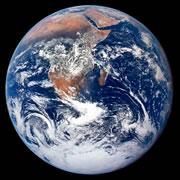 Stranger than fiction : on 1 April 2004, news@nature.com reported that climate change was making the day longer - as an April Fools' day joke (see 'Day lost to stronger trade winds'). "I'm astonished we got anywhere close to the truth," says Nicola Jones, author of the original piece. "I just made that up."NASA
Stranger than fiction : on 1 April 2004, news@nature.com reported that climate change was making the day longer - as an April Fools' day joke (see 'Day lost to stronger trade winds'). "I'm astonished we got anywhere close to the truth," says Nicola Jones, author of the original piece. "I just made that up."NASAThe warming of the world's oceans is going to shorten the day, say German researchers. But there's no need to adjust your watch: the shortening will be by only 0.12 milliseconds over the next 200 years, they estimate.
As water warms, it expands, causing sea level rise. Felix Landerer of the Max Planck Institute for Meteorology in Hamburg, Germany, and his colleagues used a computer model to find out what effect this expansion will have on the distribution of water around the globe.
The researchers looked only at heating, and not at the melting of the ice caps. So in their model, the change was not in the total mass of water in the ocean, but in the water's density and distribution. As the ocean expands and water creeps up the shorelines, the net effect is to transfer mass away from the central ocean and towards the shore.
Two factors mean that this tends to move water's mass away from the equator and towards the poles. First, the depths of the North Atlantic should warm more quickly than depths elsewhere, thanks to a current there that carries water down from the surface. So the expansion and movement of water is strongest there. Second, a quirk of our planet's geography means that the continental shelf's surface area happens to be larger at high latitudes than around the equator.
Having more mass at the poles, which is closer to Earth's axis of rotation, will make the planet spin faster. "It's like a figure skater doing a pirouette," Landerer explains. "When the arms are close to the body, you turn quicker than when they are stretched out." He reports the results of his model in Geophysical Research Letters1.
"It highlights how massive a change [in climate] is going on," says Richard Gross, an expert on the Earth's rotation working at the Jet Propulsion Laboratory in Pasadena, California. "The Earth is such a large body that it takes a huge change in mass distribution to show up in rotation."
What time is it?
"If you warm the ocean at different depths and places, water is going to spill over," agrees Rui Ponte, a climate researcher at Atmospheric and Environmental Research in Lexington, Massachusetts.
But, he says, whether and how this will affect the length of the day is less certain because we don't know much about how the oceans' depths respond to warming. "The models have various approximations and problems," notes Ponte. And melting ice caps, he points out, might take mass away from the poles and distribute it more evenly around the planet, counteracting the effect that Landerer highlights.
Several other factors also affect the length of an Earth day. The Moon's gravitational pull, for example, lengthens the day by 2.3 milliseconds a century. And interactions between Earth's liquid core and its solid mantle layer are also thought to subtly change day length.
In 2002, a group of researchers argued that climate change could make the day longer, by 0.1 millisecond a century, because of an increase in winds blowing from west to east — the opposite direction to the planet's rotation2.
ADVERTISEMENT
If all these predictions are accurate and complete (which is almost certainly not true), then that should add up to a day being 2.34 milliseconds longer a hundred years from now. That's a measurable difference, although it is important to keep in mind that day length varies by about one millisecond from day to day, says Gross, mainly because of changes in the winds.
Landerer's team are now trying to work out the other effects of redistributing the ocean. For example, he says, the Earth's axis could move slightly, changing the position of the geographic poles.
Visit our waterscouldspinthe_e.html">newsblog to read and post comments about this story.
